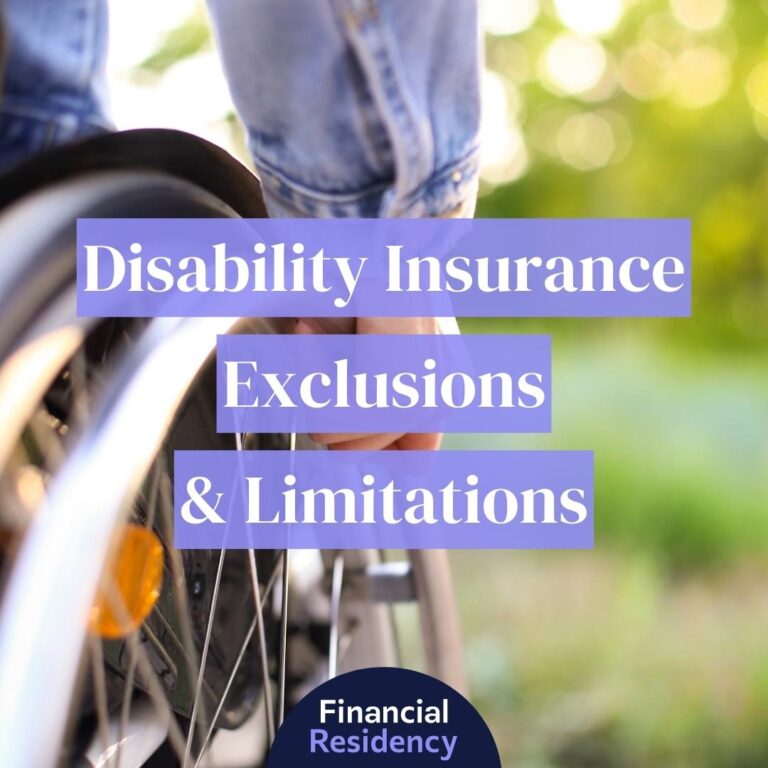Disability insurance is a safety net that provides a steady income if you can’t work due to an illness or injury, but it’s not necessary for every financial situation.
Early-career medical professionals take out disability insurance for income protection and often take advantage of as many riders as possible and look for the longest benefit period to increase their level of protection, which comes at a cost.
If disability insurance premium payments are taking up a significant portion of your budget, you may be wondering if you should adjust or drop your coverage. In this article, we’ll help you understand your disability insurance plan and evaluate whether it makes financial sense to change your coverage.
When Should I Drop a Disability Insurance Policy?
Disability insurance provides income protection to policyholders and their families when they are unable to work due to injury or illness.
If you rely on a regular income to pay your bills, and especially if you’re the breadwinner, the right disability insurance policy can keep you afloat in uncertain times.
Here are some steps to follow to determine whether you should drop your coverage.
Consider Life Changes
Life is unpredictable, and various events can impact your need for disability insurance. Consider the following scenarios:
- Marriage or divorce: Getting married or divorced can significantly alter your financial responsibilities and obligations. It’s essential to review your disability insurance to ensure it adequately protects both you and your spouse.
- Having children: The arrival of a child brings joy and added responsibilities. With additional dependents, you may need to increase your disability coverage to safeguard your family’s financial well-being.
- Change in employment: A new job, promotion, or career change can affect your income and benefits package. Some employers may include short and long-term disability coverage, but you should examine this coverage closely. It may be more affordable than individual disability insurance policies, but coverage is tied to your job.
- Retirement: As you near retirement age, you may no longer require disability insurance as you may be collecting other streams of income. Evaluate whether your financial resources and retirement plans are sufficient to sustain you in the event of a disability.
Match Your Financial Situation
Your financial situation can fluctuate over time, and it’s essential to ensure your disability insurance aligns with your current needs.
Consider the following factors when evaluating your coverage:
- Income level: If your income has increased, you may want to adjust your disability insurance to maintain enough coverage to maintain your standard of living and fixed expenses.
- Debt and expenses: Evaluate your current debt and expenses to determine whether your disability insurance coverage is sufficient to cover these financial obligations. Student loans and mortgage obligations don’t cease for people navigating an injury, disability, or under-employment.
- Savings and emergency funds: If you’ve built a substantial emergency fund or have significant savings, you may choose to adjust your disability insurance accordingly, considering these financial resources.
Regularly reassessing your disability insurance coverage will help ensure you’re adequately protected and prepared for unexpected circumstances. Consult a qualified insurance professional to determine the ideal coverage based on your unique situation.
Factor in Employer Benefits
Employers may include short and long-term disability coverage in their benefits package. Some states even require employers to provide short-term disability coverage through programs subsidized by taxpayers.
Short-term disability pays out for injuries or disabilities that keep you out of work for up to a year, whereas long-term disability coverage can extend up to retirement.
If you have confidence in your job security, accepting disability insurance benefits through your employer can reduce the cost of your premiums overall.
Drop Coverage When You’re Financially Independent
Financial independence occurs when you have accumulated sufficient assets and savings to sustain your lifestyle without relying on your current income.
If you aren’t financially independent, we recommend maintaining your disability insurance. Keeping your coverage ensures you’ll receive a portion of your income in the event of a disability, allowing you to meet your financial needs and support your dependents.
Moreover, disability insurance premiums tend to be more affordable when you’re younger and healthier. Maintaining your policy at a younger age while you’re still working allows you to secure coverage at a lower cost and protect your financial stability.
When you reach financial independence, you might not need disability insurance as you’ve built a solid financial foundation.
Dropping disability insurance when you reach financial independence allows you to redirect the funds you would have spent on premiums toward other financial goals, such as saving for retirement, investing, or pursuing new opportunities.
Your unique financial situation should inform your decision to drop disability insurance.
We recommend consulting with a financial advisor who has a fiduciary responsibility. A qualified insurance professional can also assess your specific situation and make coverage recommendations.
Consider Health Factors
As you decide whether or not to drop disability insurance, it’s important to carefully evaluate your health condition.
Before you can enroll or change your disability insurance, you’ll need to undergo a medical exam to determine your eligibility.
Your current health condition is crucial when determining if you should continue with disability insurance.
Consider the following:
- Are you currently experiencing any health issues that could potentially impact your ability to work?
- Do you have any pre-existing conditions that may increase the likelihood of needing disability insurance in the future?
- Are you receiving regular medical treatment or undergoing any treatments that could affect your employment?
Learn more:
Understand Age-Related Policy Changes
Age can also play a role in determining the right time to drop disability insurance. However, it’s important to note that no specific age automatically triggers canceling your policy.
Instead, consider the following factors:
- Are you nearing retirement age and have other sources of income or retirement savings that can provide financial security?
- Has your career trajectory reached a point where disability insurance may no longer be necessary?
- Have you experienced significant life changes that may impact your need for disability coverage?
It’s crucial to carefully evaluate your financial situation and consult a financial advisor before dropping disability insurance. They can provide personalized guidance based on your specific circumstances.
Understand the Limits of Social Security Disability Benefits
Social security provides a safety net for American taxpayers when they retire or they’re unable to work due to a disability.
Social Security Disability Benefits can be collected if you develop a disability recognized by the Social Security Administration after the age of 18, but there’s a six-month waiting period and a rigorous approval process before you can collect income.
The six-month waiting period can be grueling for people with significant expenses or families, but the monthly benefit may support you if you’ve downsized in anticipation of retirement.
Carrying sufficient disability insurance, even if you’re hoping to collect social security, can help you through difficult times.
When to Replace Your Disability Insurance Policy
It’s important to carefully weigh the benefits of replacement and consider various factors before choosing. In this section, we will explore these aspects in detail.
Weigh the Benefits of Replacement
Replacing your disability insurance policy can have both advantages and disadvantages. It is essential to evaluate these benefits before making a decision:
- Improved Coverage: A new policy may offer better terms, higher coverage limits, or additional benefits that align with your current needs.
- Cost Savings: If you can find a policy with smaller premium payments, lower deductibles, or better value for your money, replacing your existing policy can result in long-term savings.
- Enhanced Features: Some newer policies may include cost-of-living adjustments or enhanced protection for specific disabilities.
Considering these potential benefits can help you determine if replacing your disability insurance policy is a viable option.
Factors to Consider for Replacement
Disability plans aren’t all the same.
When contemplating the replacement of your disability insurance policy, take these factors into account:
- Financial situation: Assess your current financial standing, including your income, savings, and any other benefits or assets that can provide a safety net in the event of a disability.
- Occupation and lifestyle: Consider the nature of your work and the associated risks. Evaluate if your current policy adequately covers potential disabilities related to your career or lifestyle.
- Health and medical history: Your health conditions and medical history are crucial in determining the coverage you may need. Take any changes in your health since obtaining your current policy into consideration. If you have any pre-existing medical conditions, underwriting may limit your eligibility. Many disability and life insurance companies will deny coverage if you’re not in good health because you’re more likely to file a disability claim.
- Policy terms and conditions: Thoroughly review the terms and conditions of your existing policy, including any limitations, exclusions, or waiting periods. Compare these with the details of potential replacement policies. Non-cancelable and guaranteed renewable policies can be hard to come by as you age though.
- Premiums and affordability: Analyze the affordability of your current policy and the financial impact of any premium changes associated with a replacement policy.
By carefully considering these factors, you can make an informed decision on replacing your disability insurance policy.
Is Dropping My Disability Policy A Good Idea?
There are countless insurance products on the market and it’s important to have the right coverage for your needs.
There is such a thing as being overinsured, but you can also be underinsured, which carries the risk of losing out on valuable income protection.
Dropping disability insurance requires you to thoroughly assess your individual circumstances. While cutting costs by eliminating this coverage may seem tempting, evaluating the potential risks and consequences is crucial.
Additionally, being attuned to changes in your personal health, income stability, and the availability of other support systems can help you make sound decisions regarding your disability insurance.
It’s always wise to seek professional advice when you’re facing important financial choices like adjusting your disability insurance.



